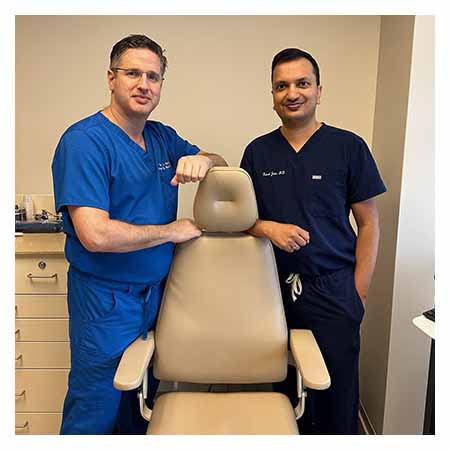Mitigating Side Effects While Optimizing Outcomes in Head and Neck Cancer
 A diagnosis of head and neck cancer remains among the most devastating diagnoses a patient can receive. Not long ago, treatment mainly addressed the tumor, with tacit acceptance of the side effects of treatment. Under the leadership of Ron Karni, MD, associate professor and chief of the Division of Head and Neck Surgery in the Department of Otorhinolaryngology at McGovern Medical School at UTHealth Houston, the landscape has changed. Through close collaboration, Dr. Karni and Kunal Jain, MD, associate professor of otorhinolaryngology, have built a comprehensive program that includes medical oncologists, radiation oncologists, and cancer rehabilitation specialists, among other health professionals. Surgical skill, technology, advances made through clinical trials, and a strong patient follow-up program provides a holistic approach to help mitigate treatment sequelae while optimizing tumor control.
A diagnosis of head and neck cancer remains among the most devastating diagnoses a patient can receive. Not long ago, treatment mainly addressed the tumor, with tacit acceptance of the side effects of treatment. Under the leadership of Ron Karni, MD, associate professor and chief of the Division of Head and Neck Surgery in the Department of Otorhinolaryngology at McGovern Medical School at UTHealth Houston, the landscape has changed. Through close collaboration, Dr. Karni and Kunal Jain, MD, associate professor of otorhinolaryngology, have built a comprehensive program that includes medical oncologists, radiation oncologists, and cancer rehabilitation specialists, among other health professionals. Surgical skill, technology, advances made through clinical trials, and a strong patient follow-up program provides a holistic approach to help mitigate treatment sequelae while optimizing tumor control.
“Although not yet widely available, transoral robotic surgery (TORS) has moved treatment for throat cancer away from primary chemotherapy and radiation toward surgery, with fewer side effects in appropriately selected patients,” says Dr. Karni, who leads one of the busiest minimally invasive transoral integrated surgical programs in the region. “These are promising technologies that we want patients to be aware of. We’re seeing more patients come to us from around the country for a second opinion.”
Dr. Jain joined the faculty at McGovern Medical School after completing a fellowship in head and neck oncology and microvascular reconstruction at the University of Pennsylvania, where TORS was pioneered. “I learned robotic surgery from the pioneers and offer this cutting-edge technology to patients to minimize the morbidity of treatment,” says Dr. Jain, who is director of head and neck surgical oncology at Lyndon B. Johnson Hospital, part of Harris Health System. “In addition to robotic surgery, I also perform reconstructive surgery in our head and neck program. Some of our minimally invasive patients need small reconstructive surgeries to ensure swallow and speech function is maintained as close as possible to normal. We offer a team-based approach to our cancer patients.”
The program also provides pretreatment assessment by cancer rehabilitation specialist Carolina Gutiérrez, MD, associate professor in the Department of Physical Medicine and Rehabilitation at the medical school. Dr. Gutiérrez determines a patient’s functional status and coordinates a variety of services, including preoperative and postoperative physical and occupational therapy. Speech-language pathology services are also available.
Physician researchers in the head and neck cancer program also are investigating novel technologies to improve patient outcomes. Under grants from several organizations, patients have been evaluated for the development of lymphedema, a common complication of treatment of head and neck cancer, using near-infrared fluorescence optical imaging and tomography for molecular imaging. The information acquired from the technology, developed by Eva Sevick, PhD, professor of molecular medicine and Kinder Chair at the Brown Foundation Institute of Molecular Medicine for the Prevention of Human Diseases, enables the development of treatments that minimize lymphedema.
Dr. Karni also serves as assistant vice president for oncology community programs at McGovern Medical School and is the physician lead of the Memorial Hermann Cancer Accountable Care Organization, one of the region’s first health system Cancer ACOs under the larger Memorial Hermann ACO umbrella.
“ACOs are groups of doctors and other health care providers who work together to give patients high-quality service and care at the right time in the right setting,” he says. “Cancer patients who see an ACO provider can expect high-quality care, a focus on service, and care coordination through physician teamwork. The effort has allowed us to align with large oncology practices across the city and work together on quality improvement projects.”
Physicians who participate in the Cancer ACO are required to meet inclusion criteria and be closely aligned with Memorial Hermann hospitals, which serve as teaching sites for McGovern Medical School. Patients benefit because their physician team has a complete picture of their current health status, as well as all treatments provided.
For more information, visit https://med.uth.edu/orl/head-neck-surgical-oncology/.